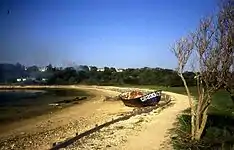Duver
A duver (pronounced to rhyme with Cover; occasionally spelt as dover) is an Isle of Wight dialect term for a low-lying piece of land along the coast, subject to occasional inundation by the sea.[1]

Abandoned boat at St Helen's Duver, Isle of Wight
The name has become part of place names on the Isle of Wight, for example Dover Street in Ryde is the street which used to run down to the duver.[2]
The word survives in the names of coastal areas at St Helens Duver, Seaview Duver and Hamstead Dover.[2]
There are relatively few dunes on the Isle of Wight,[3] and some have been reclaimed or otherwise lost, meaning that some places which bear the name duver are no longer sand dunes. The largest surviving example is St Helens Duver.[4]
References
- Pope, Colin (1989). "The historic flora of Ryde Dover". Proc. Isle of Wight Nat. Hist. Archaeol. Soc. 9: 33–40.
- Chatfield, Matthew. "Loverly Duverly – exploring the duvers of the Isle of Wight". Naturenet. Retrieved 9 August 2020.
- "Solent Forum: Sand dunes of the Solent" (PDF). Archived from the original (PDF) on 2016-01-11. Retrieved 2013-07-30.
- "The History of Bembridge Isle". Archived from the original on November 23, 2007.
This article is issued from Wikipedia. The text is licensed under Creative Commons - Attribution - Sharealike. Additional terms may apply for the media files.